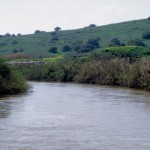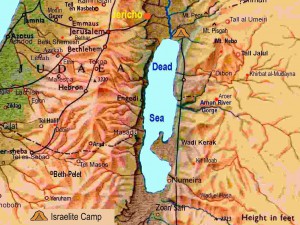Joshua 2-4 (Crossing the Jordan, Rahab)
Above: The River Jordan in all her glory.
Hm. I left my JPS Tanakh at home today and the only JPS version of the Jewish Bible I can find online is the 1917 release. Well, let's try using Judaica Press's version today, helpfully available on Chabad.org. It could be fun, since it comes with Rashi's commentary, one of those rabbis who never met a question about the Bible for which he couldn't bend over and pull out an answer.
2:1. And Joshua the son of Nun sent two men out of Shittim to spy secretly, saying, Go see the land and Jericho. And they went, and came to the house of an innkeeper named Rahab, and they lay there.
According to Jewish tradition, the two spies are Phinehas and Caleb. In theory that can't be true, since only Caleb and Joshua survived the Israelites' forty years in the desert. Phinehas should have died with the last generation. However, he actually does appear later in the Book of Joshua and gets rewarded with his own mountain, so apparently he's not.
This first verse is a good example of what I mean about Rashi's commentary: while you might only take from the above verse that Joshua sent two spies, Rashi informs us that he specifically told the two spies that they should pretend to be either deaf-mutes or potters.
And ah, yes - Rahab. I once heard someone refer to her as "the original hooker with the heart of gold." What a thought: the storytelling tradition that climaxed in 1990 with Pretty Woman begins here.
What I only noticed while studying for this post was that her reputation as a prostitute may be undeserved. Let's read that verse again.
2:1. And Joshua the son of Nun sent two men out of Shittim to spy secretly, saying, Go see the land and Jericho. And they went, and came to the house of an innkeeper named Rahab, and they lay there.
Who knew? The word for "prostitute" in Hebrew is apparently similar to - or even the same as - the word for "innkeeper". I'll bet that's gotten a lot of Hebrew men in trouble over the years.
JOSEPH: Finally! We've made it to Bethlehem. You stay here, Mary. I'll go find a prostitute.
MARY: At least you've finally admitted you see them. I knew you couldn't deal with this.
It's nice to see that the translators at Judaica Press give Rahab the benefit of the doubt.
Jewish tradition also says that Rahab not only gets to live as a reward for helping the Hebrew spies, but also gets to marry Joshua.
3:17. And the priests that bore the Ark of the covenant of the Lord stood firm arranged on the dry land in the midst of the Jordan, and all Israel passed over on dry ground, until the whole nation had completely passed over the Jordan.
In chapter 3, God repeats the miracle He did for the last generation, parting the waters of the Jordan River for Joshua's forces. The miracles in which God parts the waters are probably His most important ones in the Bible because of their symbolism. They represent God's greatest power and recall the story of Creation.
...the earth was astonishingly empty, and darkness was on the face of the deep, and the spirit of God was hovering over the face of the water. (Genesis/Bereshit 1:2)
To understand why there is water in the world before God has created anything, you need to know about other stories of how the world was created, specifically the Sumerian and Babylonian myths (remember, Abram's father Terah is from the city of Ur, which lies in that part of the world). In many mythologies but specifically these Middle-Eastern ones, water represents chaos and disorder; it has existed forever, like we think of outer space existing now. The gods make the world by creating order out of that chaotic, immortal substance. For instance, in Babylonian mythology the god Marduk creates the world by killing the ocean goddess Tiamat and splitting her in half.
In Genesis, God creates the world in a similar way (after He finishes turning on the lights so He can see what He's doing), creating space in which to work by parting the waters. His parting of a sea (or lake, or whatever) in Exodus and a river in Joshua are reminders to that.
OK, that's Joshua 2-4. Here, by the way, is a map showing where all of this is happening:
You can see Jericho, but Abel-Shittim's too small to be on this map. The Jordan River is the blue river feeding the Dead Sea from the north. The Israelites cross more or less directly east of Jericho.
While today's archaeologists dismiss a lot of the Biblical account, almost all of the ones I've read do agree that the Israelites came to settle Canaan through its eastern border, so I think the Book of Joshua does get its geography right here.
PREVIOUS ENTRIES IN THIS SERIES: Joshua 1.
This entry was tagged. Bible Commentary Joshua

